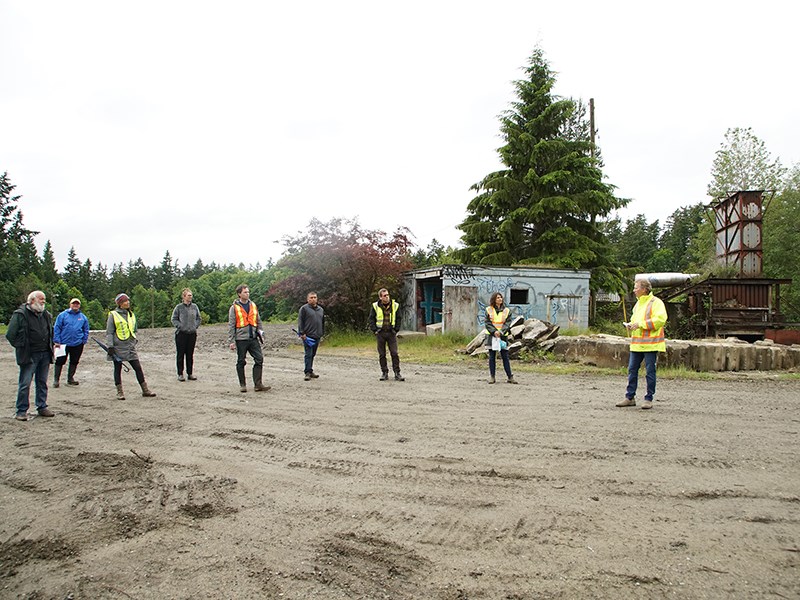qathet Regional District (qRD) board has voted to allocate up to $100,000 of community works funds to revegetate disturbed soils and the riparian area at the Marine Avenue landfill closure site.
At the January 28 regional board meeting, directors considered the motion to reduce off-site migration of sedimentation. The funds will be expended if currently allocated funding for the project is insufficient.
Electoral Area B director Mark Gisborne said he opposed the initiative at the January 20 finance committee meeting because community works funds are given to regional districts on the basis of the population of electoral areas. He said what the regional district is proposing is taking $100,000, which, in his opinion, should be going to electoral area services.
“I would like to remind the assembly that the municipality also gets its fair share of community works funds for municipal services,” said Gisborne. “I am opposed to using community works funds for shared services when the electoral area services have such a need.”
Electoral Area E director Andrew Fall said funding that City of Powell River may get for its community works fund doesn’t have a bearing on decisions made by the qRD board.
“I do agree in some ways that the formula for the community works fund for the regional district should tend to go to services that benefit the rural areas, but that does not mean we should use that as the sole criteria,” said Fall. “This project benefits everyone in the regional district equally. This is one that happens to be in the boundary of the city but the benefit is broad over the whole community.
“When you look at the range of the projects the community works fund has supported, by and large they are benefitting areas all over the place. The merits of the project are the main thing we should be looking at. This one is justified.”
Electoral Area C director Clay Brander said the money will come out of community works if the project funding isn’t sufficient and he has no problem with it.
“The rural areas benefit from a lot of things the city takes on,” said Brander. “This is one way the municipality could potentially benefit from community works funding earmarked for the project.”
The regional board voted in favour of the community works fund allocation, with Gisborne opposed.
At the January 20 meeting, Gisborne said he had a question about where community works funding comes from and how it is allocated to the regional district. He wanted to know if it was granted to the entire regional district or just electoral areas. Gisborne also asked why this wouldn’t be part of the contract for the resource-recovery centre.
“It seems like $100,000 is a lot of money,” said Gisborne. “I’d prefer to see a cost upfront as opposed to a cost-plus.”
Manager of financial services Linda Greenan said community works funding is the federal gas tax and it is based on rural population. She said there is a second stream of funding to the city based on its population. Greenan added there is a policy guide of how qRD will consider allocation of the fund.
Manager of asset management and strategic initiatives Mike Wall said the second phase of the resource-recovery centre project was the landfill closure piece. He said there was machinery all over the site, digging up material. He said the estimated 8,000 cubic metres of buried ash turned out to be more like 20,000 cubic metres, resulting in more disturbance of the area.
“Once those areas were opened up and the landfill closure was done, we have experienced some rather heavy rainfalls,” said Wall. “This is really about doing our due diligence in trying to revegetate all of the areas during this heavy second phase of the project.”
Gisborne said in response to Greenan’s answer that funding comes to qRD based on electoral area population, the community works funding is given to regional districts with the idea it should be used primarily for electoral area services. He said his interpretation of the motion is that $100,000, which is given to regional districts for electoral areas, is going to be given to a regional service, where half of the funding comes from electoral areas and half comes from municipal residents.
“I don’t think I can support this resolution because it comes back to what’s fair in terms of funding,” said Gisborne. “It’s a lot of money and it should go to Myrtle Pond water system or the Lund sewer, community hall structures and electoral area services. On the principle of fairness, I will be voting against this resolution.”
Fall said minimizing erosion and sedimentation at this site is important and seems to support many of the goals in the qRD strategic plan.
“In principle, the community works fund seems to be an appropriate source,” he added.
Greenan said the project aligns well with the qRD strategic priority of climate change and has a regional focus, benefitting a large portion of the population.
City director CaroleAnn Leishman said this is a perfect project for the community works fund. She said the entire region has to deal with solid waste and it is a great project going forward, which she supports.
The finance committee voted to recommend the board allocate up to $100,000 of community works funding to revegetate the disturbed soils and riparian areas at the Marine Avenue landfill closure site to reduce off-site migration of sedimentation, if the currently allocated funding for the project is insufficient, with Gisborne opposed.



